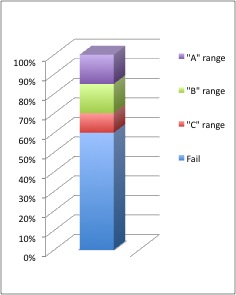Physics 5A (Fall 2013): Introduction to Physics I
Course information
Instructor: Stefano Profumo
Office: ISB, Room 325
Phone Number: 831-459-3039
Office Hours: Thursday, 10-11:30AM, ISB 165
E-mail: profumo AT ucsc.edu
eCommons Website
 ALL HOMEWORK ASSIGNMENTS AND QUIZZES WILL BE POSTED ON THE COURSE'S ECOMMONS WEBPAGE!!!
ALL HOMEWORK ASSIGNMENTS AND QUIZZES WILL BE POSTED ON THE COURSE'S ECOMMONS WEBPAGE!!!
Class Hours
Lectures: MWF 02:00PM-03:10PM Thimann Lecture Hall 3
Discussion Section: TBD
Course description
Elementary mechanics. Vectors, Newton's laws, inverse square force laws, work and energy, conservation of momentum and energy, and oscillations (Chapters 1-11+14 of Giancoli)
Prerequisites
- Concurrent enrollment in PHYS 5L is required
Textbook
- Physics for Scientists and Engineers, 4th edition , by Douglas Giancoli
Course Grading and Requirements
Student evaluations will be based on their performance in the following four tasks. The tasks and their relative weights in determining the students' overall course grades are given below:\\
- 30% Weekly Homework (9 problem sets)
- 10% TopHat Quizzes (participation and performance)
- 20% Midterm Exam (Friday, October 25, 2:00 PM -- 3:00 PM)
- 40% Final Exam (Thursday, December 12, 8:00 PM -- 11:00 AM)
|
Weekly Homework and TopHat Quizzes
Weekly homework assignments will be posted on the eCommons website each Friday (with the exception
of Thanksgiving week) and are due in class, at the beginning of class on the Friday of the following week.
The homework problem sets are (effectively) not optional, and will consist of a few problems from Giancoli.
You are encouraged to discuss the class material and homework problems with your classmates and to work in groups,
but all submitted problems should represent your own work and understanding. Late homework can be submitted to the grader,
but will not contribute any points to the final grade. I will grant one late homework exception-to-policy,
for exceptional and well-motivated and documented reasons. The Grader will grade each homework, and is responsible
for the given grade. Grades for each homework problem will consist of 2 points (mostly correct), 1 point (less than 50% c
orrect) or 0 points. There will be 9 homework assignments, and they will contribute
about 3.3% each to the final grade, for a total of 30%.
We will make use of a software (TopHat) that substitutes the traditional "clickers". You will be able to use any web device, or your cell phone, to answer typically multiple-answer or numerical questions. We will use TopHat in class and sometimes I will assign warm-up questions on assigned reading for you to answer before the beginning of class.
Midterm and Final
The midterm exam and the final exam will be held in the same classroom as
the lectures. The midterm will be a 1 hour written exam in class (regular lecture time) on Firday October 25, while the final (Thursday, December 12, 8:00 PM -- 11:00 AM) will be three hours long and cover
the complete course material. Both the midterm and the final will be closed-book, but you will be allowed one page, A4 format, front and back, of notes. Only non-graphical,
non-programmable calculators will be allowed (it will be up to the discretion of the Instructor to decide whether a calculator is or not allowed). Laptop
computers and more or less smart cellular phones of any kind will not be allowed. A practice midterm and final will be handed out a week before the exams. You must take the
final exam to pass the course. The midterm will be worth 20% of the grade, the final 40%
The minimum score not to fail the class is 60%.
The final grade will follow the percent guideline below:
- 60% to 70%: C range
- 70% to 85%: B range
- 85% to 100%: A range
|

|
Galileo's Corner
La filosofia e' scritta in questo grandissimo libro che continuamente ci sta aperto innanzi a gli occhi (io dico l'universo), ma non si puo' intendere se prima non s'impara a intender la lingua, e conoscer i caratteri, ne' quali e' scritto. Egli e' scritto in lingua matematica, e i caratteri son triangoli, cerchi, ed altre figure geometriche, senza i quali mezzi e' impossibile a intenderne umanamente parola; senza questi e' un aggirarsi vanamente per un oscuro laberinto. (Galileo Galilei, Il Saggiatore, 1623)
Philosophy (Knowledge) is written in that great book which ever lies before our eyes (I call it the Universe), but we cannot understand it if we do not first learn the language and grasp the symbols in which it is written. It is written in mathematical language, and the letters are triangles, circles and other geometrical figures, without which means it is humanly impossible to comprehend a single word; without knowledge of those, it's a useless wandering in a dark labyrinth.






![]() ALL HOMEWORK ASSIGNMENTS AND QUIZZES WILL BE POSTED ON THE COURSE'S ECOMMONS WEBPAGE!!!
ALL HOMEWORK ASSIGNMENTS AND QUIZZES WILL BE POSTED ON THE COURSE'S ECOMMONS WEBPAGE!!!
